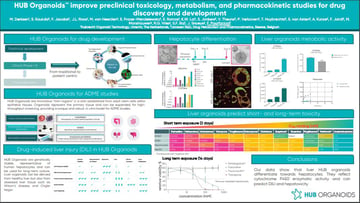HUB Organoids applications to drug safety and ADME evaluation
HUB Organoids improve preclinical toxicology, metabolism, and pharmacokinetic studies for drug discovery and development
Discover our latest data on the application of HUB Organoids to the preclinical evaluation of a compound safety and ADME profile.

Drug safety assessment at the preclinical stage is hampered by a lack of in vitro models that recapitulate healthy tissue physiology and gene expression for the evaluation of on- and off-target effects, drug metabolism, and pharmacokinetics (PK). Preclinical studies using animal model are costly and not always translatable to humans. On the other hand, standard patient-derived in vitro models such as primary cells have limited availability, expansion capacity, and are not stable in culture for experimental testing. Therefore there remains a need for advanced systems that can offer patient relevance and scalability to address drug toxicology, metabolism, and PK.
Download this poster to discover:
- Differentiated human liver organoids are promising models to study drug-induced liver injury and drug metabolism
- HUB Organoids can differentiate interspecies and regional toxicity differences as expected from in vivo studies
- HUB Organoids can predict toxicity of a test compound with different modes of action
